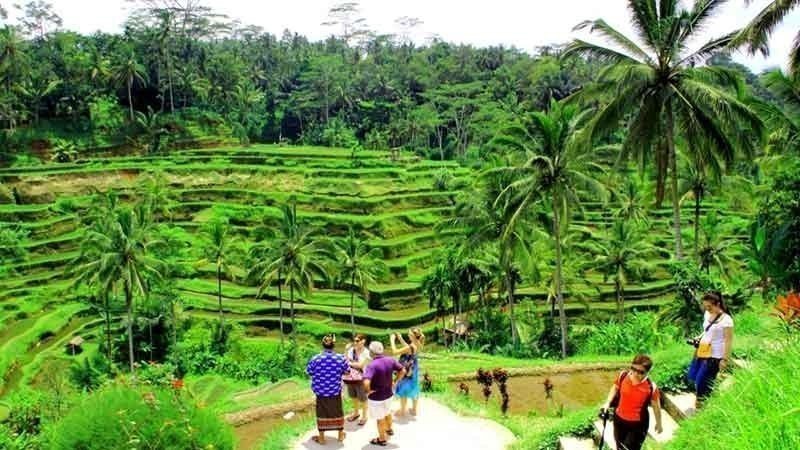How Agrotourism in Ubud Attaches You to Local Society and Nature
How Agrotourism in Ubud Attaches You to Local Society and Nature
Blog Article
Exploring the Rich Society and Awesome Landscapes of Agrotourism in Ubud
Ubud, usually celebrated as the heart of Bali, provides a special chance for those looking for to experience agrotourism that seamlessly mixes social richness with awe-inspiring landscapes. This interesting location provides a selection of activities, from involving with the elaborate craftsmanship of neighborhood craftsmens to discovering the green rice balconies that define the region's farming heritage. As tourists navigate through Ubud's vivid tapestry of customs, they are welcomed to discover the tales behind each social technique and landscape function. What exists underneath the surface area of this exciting experience is a detailed internet of heritage and nature waiting for expedition.
Uncovering Ubud's Cultural Heritage
Snuggled in the heart of Bali, Ubud functions as a vibrant center for those anxious to look into the island's abundant cultural heritage. Known for its imaginative customs, Ubud is a hub where ancient methods fulfill contemporary expressions, producing an one-of-a-kind tapestry of social experiences. Visitors are attracted to its myriad of galleries, holy places, and workshops, each offering a glance into Bali's creative and historic tradition.
Central to Ubud's cultural allure is the Ubud Royal residence, a substantial landmark that stands as a testament to the area's royal heritage. The royal residence regularly holds traditional dance efficiencies, providing a genuine understanding into Balinese narration via dance and music. The roads of Ubud are lined with galleries showcasing jobs of both popular Balinese artists and emerging skills, mirroring the island's dynamic art scene.

Immersive Agricultural Knowledge

In addition, Ubud's agrotourism efforts commonly consist of workshops on sustainable farming practices. These workshops emphasize the importance of chemical-free farming, permaculture, and biodiversity conservation, often under the assistance of knowledgeable professionals. They act as an instructional system for travelers, fostering a deeper admiration for the complexities of sustainable agriculture.
Furthermore, visitors can discover coffee and cacao plantations, where they find out about the procedures of cultivation and production. Led tours offer detailed explanations of each action, from bean to mug or chocolate husk to delicious chocolate bar, enhancing the overall understanding of these significant farming items.
These immersive experiences not just enhance visitors' understanding of Ubud's farming heritage however likewise promote sustainable tourism practices, guaranteeing the preservation of these social landscapes for future generations.
Breathtaking Rice Terraces and Landscapes
Building on the immersive farming experiences, visitors are drawn to the captivating picturesque rice terraces and landscapes that specify Ubud's countryside. The renowned Tegalalang Rice Terraces are specifically distinguished, using an exquisite display screen of Balinese resourcefulness in farming. These terraces are not only useful yet likewise offer as a testimony to the unified connection between the Balinese individuals and their setting. The subak watering system, a UNESCO-recognized social heritage, showcases a sustainable and ancient method of water administration that remains to support regional farming.
As visitors traverse the winding paths through the terraces, they are met scenic sights that stretch across verdant areas, punctuated by persuading coconut palms and the remote shape of Mount Agung. The landscape supplies a calm background that welcomes reflection and gratitude of nature's elegance (Agrotourism in Ubud). For those interested in photography, the ever-changing light and shadows cast by the daybreak or sunset offer numerous chances for capturing spectacular images
Beyond the balconies, Ubud's Learn More Here moving hills and lavish greenery produce a varied tapestry that beckons exploration. Hiking routes meander via these landscapes, enabling site visitors to connect with the land and experience the serene rhythm of country life.
Farm-to-Table Culinary Delights
Among the all-natural beauty of Ubud's landscapes, the farm-to-table motion supplies an authentic culinary experience that links visitors with the area's agricultural heritage. This method commemorates the symbiotic partnership in between the land and its fruit and vegetables, with regional farms offering fresh, organic components to Ubud's innovative cooks. Site visitors are welcomed to participate in a gastronomic trip where the beginnings of each ingredient are transparently showcased.
In Ubud, farm-to-table eating goes beyond simple intake; it ends up being an academic experience. Restaurants usually offer guided scenic tours of the ranches supplying their kitchen areas, permitting diners to witness sustainable farming practices firsthand. This connection fosters a much deeper admiration for the precise care that goes right into growing the crops and increasing animals.
The culinary offerings show the abundant diversity of Ubud's farming landscape, including dishes that highlight seasonal fruit and vegetables and typical Balinese flavors. From lively salads teeming with exotic environment-friendlies to aromatic curries instilled with fresh herbs, each plate is a testimony to the region's bountiful harvests.
Furthermore, the farm-to-table values sustains regional farmers and neighborhoods, making certain that agricultural traditions are preserved while advertising economic sustainability. This movement highlights a commitment to top quality, sustainability, and the event of Ubud's unique terroir.
Engaging With Regional Artisans
Lots of site visitors locate themselves captivated by the detailed craftsmanship of Ubud's neighborhood artisans, whose job mirrors the region's abundant cultural heritage. These artisans, frequently masters of their craft, contribute substantially to Ubud's dynamic social landscape. From traditional batik fabrics to meticulously carved wooden artefacts, each item informs a story linked with generations of knowledge and custom.
Involving with these artisans supplies a distinct chance to delve deeper right into Balinese society. Lots of workshops use hands-on experiences, where travelers can find out methods given through centuries. These interactive sessions not just foster admiration for the artisans' abilities yet additionally provide a meaningful link to the region's history and customs.
Visitors can check out craftsmen villages such as Mas, renowned for its fine wood carvings, or Celuk, renowned for beautiful silver jewelry. Here, one can witness the commitment and accuracy required to create each work of art. Purchasing straight from these artisans makes sure that the proceeds sustain local areas and sustain typical techniques.
In Ubud, involving with regional artisans is not merely a traveler task; it Our site is an improving cultural exchange that boosts the agrotourism experience, leaving site visitors with a much deeper understanding and gratitude of Bali's creative heritage. - Agrotourism in Ubud
Conclusion
The exploration of Ubud's agrotourism uses an extensive gratitude for Balinese social heritage and all-natural elegance. The combination of conventional dance, hands-on farming, and spectacular rice balconies develops a special tapestry of experiences that captivate visitors. The farm-to-table culinary offerings showcase the region's farming bounty, while communications with local artisans supply understanding into Ubud's rich imaginative customs. Jointly, these aspects foster a deeper understanding and appreciation of Ubud's withstanding all-natural and social attraction.
Central to Ubud's social allure is the Ubud Palace, a considerable landmark that stands as a testament to the area's imperial heritage.Ubud supplies a myriad of immersive farming experiences that enable site visitors to involve deeply with the island's agricultural lifestyle.Building on the immersive farming i was reading this experiences, visitors are attracted to the exciting breathtaking rice balconies and landscapes that specify Ubud's countryside.In the middle of the natural beauty of Ubud's landscapes, the farm-to-table motion offers a genuine culinary experience that links site visitors with the region's farming heritage.Many site visitors discover themselves captivated by the detailed craftsmanship of Ubud's neighborhood artisans, whose work shows the region's abundant cultural heritage.
Report this page